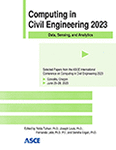Cognitive Load Assessment in Learning Construction Sensor Data Analytics within an End User Programming Environment
Publication: Computing in Civil Engineering 2023
ABSTRACT
Computational thinking-supported educational training can equip the construction workforce with the necessary skills and knowledge to implement sensing technologies and perform sensor data analytics aimed at enhancing construction operations. However, construction students struggle to understand the computational concepts and workflows required to translate low-level sensor data into knowledge for supporting decisions. This study compared the cognitive load of construction students performing similar data analytics tasks using an end-user programming environment (EUP) to conventional MS Excel. Comparative analysis using descriptive and inferential statistics demonstrated that participants using EUP perceived lower levels of cognitive loads and more positive experiences than those who used the conventional techniques. The study’s findings will advance the understanding of the potential cognitive effects of adopting EUPs for construction sensor data analytics. This study contributes to the cognitive theory of multimedia learning by illustrating how multimodal programming environments can influence learners’ cognitive demands.
Get full access to this article
View all available purchase options and get full access to this chapter.
REFERENCES
Arabshahi, M., Wang, D., Sun, J., Rahnamayiezekavat, P., Tang, W., Wang, Y., and Wang, X. (2021). “Review on Sensing Technology Adoption in the Construction Industry.” Sensors (Basel, Switzerland), 21(24), 8307.
Baduge, S. K., Thilakarathna, S., Perera, J. S., Arashpour, M., Sharafi, P., Teodosio, B., Shringi, A., and Mendis, P. (2022). “Artificial intelligence and smart vision for building and construction 4.0: Machine and deep learning methods and applications.” Automation in Construction, 141, 104440.
Bau, D., Gray, J., Kelleher, C., Sheldon, J., and Turbak, F. (2017). “Learnable programming: blocks and beyond.” Communications of the ACM, 60(6), 72–80.
Glas, M., Vielberth, M., Reittinger, T., Böhm, F., and Pernul, G. (2023). “Improving cybersecurity skill development through visual programming.” Information & Computer Security, ahead-of-print(ahead-of-print).
Gong, J., and Caldas, C. H. (2012). An Intelligent Video Computing Method for Automated Productivity Analysis of Cyclic Construction Operations. 64–73.
Google Inc. (2020). “Blockly Developers Google.” <https://developers.google.com/blockly>.
Krishnamurthi, R., Kumar, A., Gopinathan, D., Nayyar, A., and Qureshi, B. (2020). “An overview of IoT sensor data processing, fusion, and analysis techniques.” Sensors, 20(21), 6076.
Kumar, N., and Kumar, J. (2016). “Measurement of Cognitive Load in HCI Systems Using EEG Power Spectrum: An Experimental Study.” Procedia Computer Science, 84, 70–78.
Mansouri, S., Castronovo, F., and Akhavian, R. (2020). “Analysis of the Synergistic Effect of Data Analytics and Technology Trends in the AEC/FM Industry.” Journal of Construction Engineering and Management, 146(3), 04019113.
Mayer, R. E. (2005). “Cognitive theory of multimedia learning.” The Cambridge handbook of multimedia learning, 41, 31–48.
Mneymneh, B. E., Abbas, M., and Khoury, H. (2019). “Vision-Based Framework for Intelligent Monitoring of Hardhat Wearing on Construction Sites.” Journal of Computing in Civil Engineering, 33(2), 04018066.
Tawfik, A. A., Payne, L., and Olney, A. M. (2022). “Scaffolding Computational Thinking Through Block Coding: A Learner Experience Design Study.” Technology, Knowledge and Learning.
Tudoreanu, M. E. (2003). “Designing effective program visualization tools for reducing user’s cognitive effort.” Proceedings of the 2003 ACM symposium on Software visualization, Association for Computing Machinery, San Diego, California, 105–ff.
Tze Wei, L., and Su-Mae, T. (2016). “The Effects of Positive and Negative Mood on Cognition and Motivation in Multimedia Learning Environment.” Journal of Educational Technology & Society, 19(2), 104–115.
Unal, A., and Topu, F. B. (2021). “Effects of teaching a computer programming language via hybrid interface on anxiety, cognitive load level and achievement of high school students.” Education and Information Technologies, 26(5), 5291–5309.
Wing, J. M. (2008). “Computational thinking and thinking about computing.” Philosophical Transactions of the Royal Society A: Mathematical, Physical and Engineering Sciences, 366(1881), 3717–3725.
Information & Authors
Information
Published In
History
Published online: Jan 25, 2024
ASCE Technical Topics:
- Business management
- Computer programming
- Computing in civil engineering
- Construction engineering
- Construction management
- Data analysis
- Design (by type)
- Education
- Employment
- Engineering education
- Engineering fundamentals
- Labor
- Load factors
- Measurement (by type)
- Methodology (by type)
- Personnel management
- Practice and Profession
- Research methods (by type)
- Sensors and sensing
- Structural design
- Students
Authors
Metrics & Citations
Metrics
Citations
Download citation
If you have the appropriate software installed, you can download article citation data to the citation manager of your choice. Simply select your manager software from the list below and click Download.
